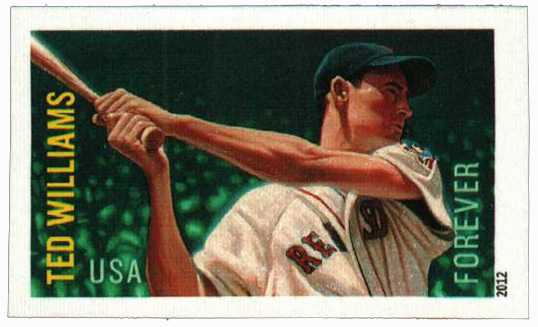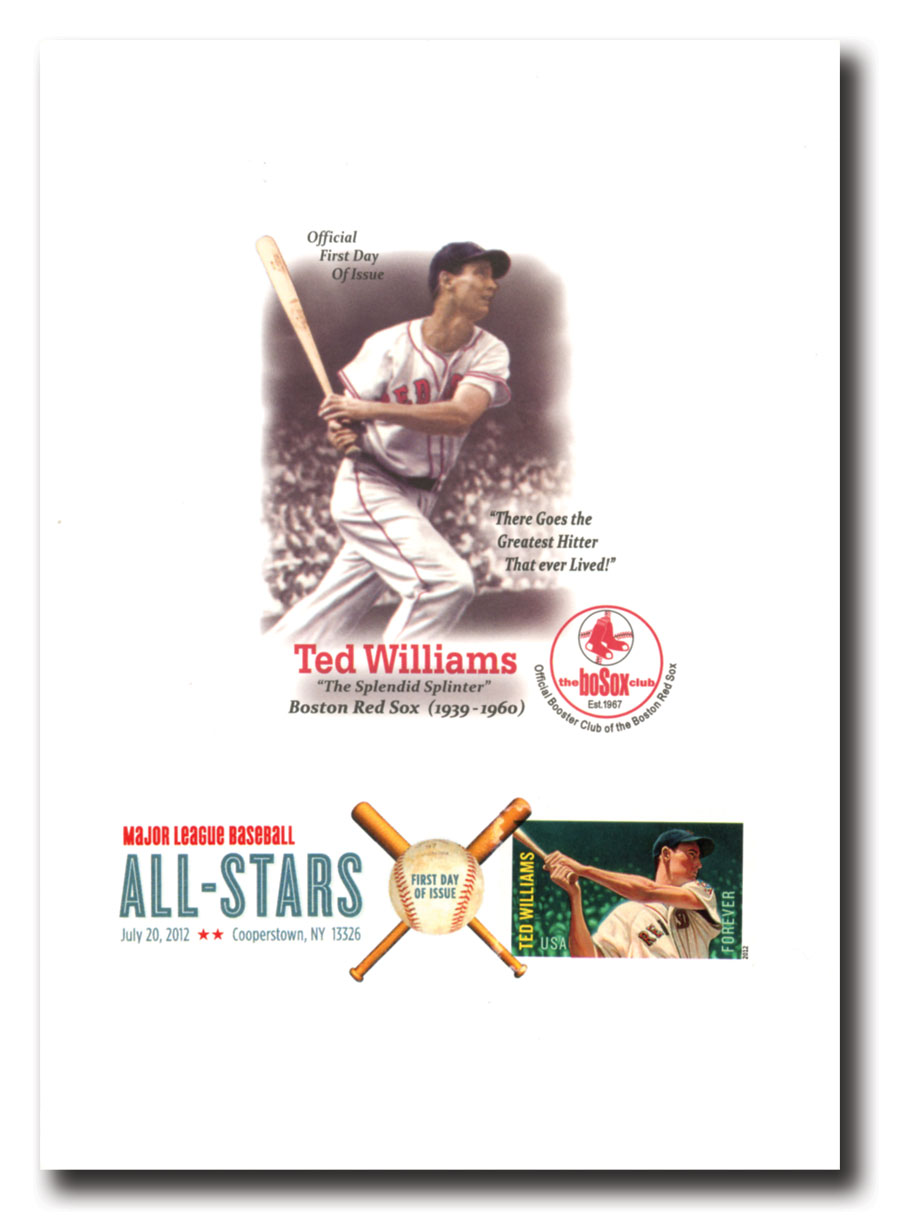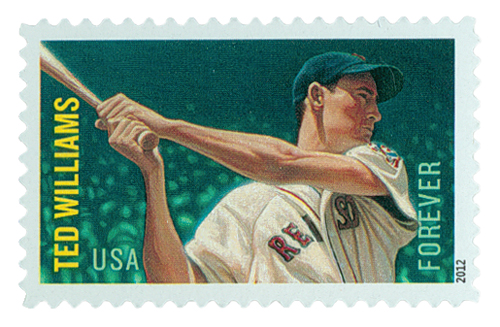
# FD779 - Major League All-Stars First Day Cover - Ted Williams - Cancelled at Boston, Massachusetts on 7/21/2012 (#4694)
Own 2012 Ted Williams Cover Canceled in Boston Red Sox' Backyard
This limited-edition cover is an extra-special tribute to Ted Williams and his Boston Red Sox career. It was canceled right in Boston, Massachusetts and will make a nice addition to your collection. Order now.
Happy Birthday, Ted Williams
Williams first learned to throw a baseball when he was eight. His uncle Saul taught him. Saul had been a semi-professional player who once played against Babe Ruth, Lou Gehrig, and Joe Gordon in an exhibition game.

Williams enjoyed playing baseball throughout his childhood and was the pitcher and star player of his high school team. He also played American Legion Baseball and was later named their Graduate of the Year. Williams was so talented, he began receiving offers from major league teams in St. Louis and New York while in high school, but his mother didn’t want him to leave home at such a young age. Instead he joined the local minor league team, the San Diego Padres.

Williams played for the Padres in 1936 and 1937. During that time, he caught the attention of the Boston Red Sox general manager, who was at a game to scout a different player. In late 1937, he was traded to the Red Sox and earned the nickname “The Kid” during spring training. He then went to play for their minor league team, the Minneapolis Millers. Williams performed well – he had a 22 game hitting streak and ended the season with a .366 average, 46 home runs, and 142 runs batted in (RBIs). He also came in second for the league’s Most Valuable Player award.

The following season, the Red Sox traded their right fielder to make room for Williams to join the major league team. He played his first major league game on April 20, 1939, against the New York Yankees. During his debut season, Williams hit .327 with 31 home runs and 145 RBIs. He was the first rookie to lead the league in RBIs and set a rookie record for walks. While the Rookie of the Year Award hadn’t been established yet, Babe Ruth declared that Williams was the Rookie of the Year, which Williams said was good enough for him.

Despite being one of baseball’s rising stars, Williams had to take a break from the game in 1942 to contribute to the war effort. He trained to be a naval aviator and served as a flight instructor before being sent to Pearl Harbor. However, the war ended before he got his orders and he was released from active duty on January 12, 1946, though he remained in the Marine Corps Reserve.

Williams was again called upon to serve his country in 1952, being recalled to active duty to join in the Korean War. Though he hadn’t flown in a few years, he didn’t want to spend the war on a service baseball team. He was assigned to VMF-311, Marine Aircraft Group 33 in Pohang, South Korea. In 1953, he served as the wingman for John Glenn on a raid south of Pyongyang. Williams’ plane was struck on the way back and he managed to land just moments before it caught fire. He earned the Air Medal for his actions that day. During the war, he flew 39 combat missions, earning two Gold Stars. He would also fly as Glenn’s wingman several more times.

Williams returned to the Red Sox and played a few more years, playing his last game on September 28, 1960. Williams ranks among the all-time great hitters – 521 home runs, 2,654 hits, a .344 batting average, 2,021 walks, and 1,839 runs batted in. He also holds the record for career on-base percentage with .482. Additionally, Williams played in 19 All-Star Games, was voted MVP twice, was a batting champion six times, and won the Triple Crown twice.

Williams was inducted into the Baseball Hall of Fame the first year he was eligible, 1966. He also went on to manage the Washington Senators and Texas Rangers between 1969 and 1972. In retirement, Williams greatly enjoyed fishing and was even named to the International Game Fish Association Hall of Fame. He also worked with the Jimmy Fund to raise millions of dollars for cancer research and care. In 1991, he received the Presidential Medal of Freedom, America’s highest civilian honor.

In 1999, Williams threw out the first pitch at the All-Star Game and received a standing ovation that lasted several minutes. It was the first time he ever waved his hat to the crowd. Later that year he was part of the MLB’s All-Century Team honored at the World Series. Williams suffered from cardiomyopathy in his final years and died on July 5, 2002. A tunnel in Boston and a road in California have been named in his honor. The Tampa Bay Rays Tropicana Field is also home to the Ted Williams Museum.
Click here for more about Williams; his career, stats, photos, and more from the Baseball Hall of Fame.
Own 2012 Ted Williams Cover Canceled in Boston Red Sox' Backyard
This limited-edition cover is an extra-special tribute to Ted Williams and his Boston Red Sox career. It was canceled right in Boston, Massachusetts and will make a nice addition to your collection. Order now.
Happy Birthday, Ted Williams
Williams first learned to throw a baseball when he was eight. His uncle Saul taught him. Saul had been a semi-professional player who once played against Babe Ruth, Lou Gehrig, and Joe Gordon in an exhibition game.

Williams enjoyed playing baseball throughout his childhood and was the pitcher and star player of his high school team. He also played American Legion Baseball and was later named their Graduate of the Year. Williams was so talented, he began receiving offers from major league teams in St. Louis and New York while in high school, but his mother didn’t want him to leave home at such a young age. Instead he joined the local minor league team, the San Diego Padres.

Williams played for the Padres in 1936 and 1937. During that time, he caught the attention of the Boston Red Sox general manager, who was at a game to scout a different player. In late 1937, he was traded to the Red Sox and earned the nickname “The Kid” during spring training. He then went to play for their minor league team, the Minneapolis Millers. Williams performed well – he had a 22 game hitting streak and ended the season with a .366 average, 46 home runs, and 142 runs batted in (RBIs). He also came in second for the league’s Most Valuable Player award.

The following season, the Red Sox traded their right fielder to make room for Williams to join the major league team. He played his first major league game on April 20, 1939, against the New York Yankees. During his debut season, Williams hit .327 with 31 home runs and 145 RBIs. He was the first rookie to lead the league in RBIs and set a rookie record for walks. While the Rookie of the Year Award hadn’t been established yet, Babe Ruth declared that Williams was the Rookie of the Year, which Williams said was good enough for him.

Despite being one of baseball’s rising stars, Williams had to take a break from the game in 1942 to contribute to the war effort. He trained to be a naval aviator and served as a flight instructor before being sent to Pearl Harbor. However, the war ended before he got his orders and he was released from active duty on January 12, 1946, though he remained in the Marine Corps Reserve.

Williams was again called upon to serve his country in 1952, being recalled to active duty to join in the Korean War. Though he hadn’t flown in a few years, he didn’t want to spend the war on a service baseball team. He was assigned to VMF-311, Marine Aircraft Group 33 in Pohang, South Korea. In 1953, he served as the wingman for John Glenn on a raid south of Pyongyang. Williams’ plane was struck on the way back and he managed to land just moments before it caught fire. He earned the Air Medal for his actions that day. During the war, he flew 39 combat missions, earning two Gold Stars. He would also fly as Glenn’s wingman several more times.

Williams returned to the Red Sox and played a few more years, playing his last game on September 28, 1960. Williams ranks among the all-time great hitters – 521 home runs, 2,654 hits, a .344 batting average, 2,021 walks, and 1,839 runs batted in. He also holds the record for career on-base percentage with .482. Additionally, Williams played in 19 All-Star Games, was voted MVP twice, was a batting champion six times, and won the Triple Crown twice.

Williams was inducted into the Baseball Hall of Fame the first year he was eligible, 1966. He also went on to manage the Washington Senators and Texas Rangers between 1969 and 1972. In retirement, Williams greatly enjoyed fishing and was even named to the International Game Fish Association Hall of Fame. He also worked with the Jimmy Fund to raise millions of dollars for cancer research and care. In 1991, he received the Presidential Medal of Freedom, America’s highest civilian honor.

In 1999, Williams threw out the first pitch at the All-Star Game and received a standing ovation that lasted several minutes. It was the first time he ever waved his hat to the crowd. Later that year he was part of the MLB’s All-Century Team honored at the World Series. Williams suffered from cardiomyopathy in his final years and died on July 5, 2002. A tunnel in Boston and a road in California have been named in his honor. The Tampa Bay Rays Tropicana Field is also home to the Ted Williams Museum.
Click here for more about Williams; his career, stats, photos, and more from the Baseball Hall of Fame.













